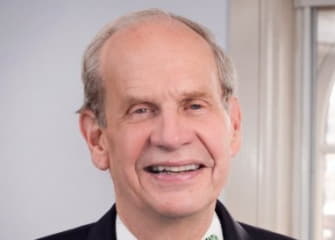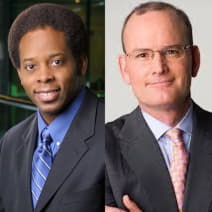
Tom Wilcox
Click here for Part I, Part II & Part IV
Tom Wilcox, 69, will step down from the Baltimore Community Foundation at the end of the year, after 17 years at the helm of the umbrella philanthropic organization that brings together scores of donors and millions of dollars for the welfare of Greater Baltimore.
When Wilcox assumed leadership of the BCF, it gave out grants of $5 million annually. As he readies to exit, that number has grown five-fold to $25 million, while the endowment at its command is inching toward $200 million.
In an interview with DLA Piper’s
Guy Flynn and former Legg Mason CEO Mark Fetting, Wilcox recounts his distinguished stint at the head of “a philanthropic bank,” after nearly two decades in education as head of Concord Academy. “Baltimore boasts of a growing economy, in which all have the opportunity to thrive. It’s about merging economic development with poverty reduction, so that all boats go up, and particularly those people who aren’t yet even swimming necessarily can be fully floating and moving forward,” Wilcox said.
Flynn, a lawyer, is a member of the five-person Baltimore City Board of Ethics and a past chairman of the Maryland State Bar Association’s Real Property Section Discussion Group. Fetting is associated with a variety of charitable and philanthropic work and headed United Way of Central Maryland’s fundraising campaign in 2013.
MARK FETTING: I am Mark Fetting and I am a business advocate having spent my career in the investment management business at T. Rowe Price, at Prudential, and at Legg Mason where I served as chairman and CEO. But I’ve also spent a good chunk of my career as a community advocate, and I have enjoyed being a trustee. This is my second tour and it is just a pleasure. So here we are, Tom, in the hall of fame of donors and I wonder before we get into, go off script a little bit, and highlight a couple of the wonderful and substantial leaders that are not with us as portrayed here.
TOM WILCOX: Well, let me start right over here with Clementine Peterson, who was the first woman on the BCF board and the first woman member of the BCF Grant Making Committee. She started endowments for nonprofits around Baltimore, giving them the permanent tools to be able to thrive and ensuring that if they didn’t survive, that the endowments would stay here to serve a larger purpose in perpetuity.
One can’t talk about philanthropy in Baltimore without talking about Eddie and Sylvia Brown. I came to BCF in no small part because I recognized Eddie from Wall Street Week and knew something about it and studied more, and BCF made the smart decision of having both Eddie and Freeman Hrabowski call me during the recruitment period and that was pretty persuasive, and certainly the most humbling experience of my life has been serving as a trustee of their family foundation for the last 17 years. Eddie actually had me go around and accept rewards on his behalf when he wasn’t free and I would explain that I was the twin separated at birth and that sadly he got the looks and the brains, I got to be his double elsewhere and this has been a hard life to lead. What Eddie has done with the Turning the Corner Program, what the two of them have done together from institutions that range from MICA to the Pratt Library to you name it, it is just remarkable, and really helped BCF get to the next level.
In the corner is a woman named Mary Ruff Brush who owned the Broadview Apartments for many years and was the first woman head of a major Baltimore real estate firm. She was as tough a cookie as I’ve ever known and she said, Mr. Wilcox, I want this and I want that, but had the biggest heart ever. She made it very clear to me that if some money were to come our way that she wanted it for some very strong opportunities for people to be able to change their lot in life. The good news was that when she died, she left us $8 million. That is a lot of money that actually the education committee chaired by you gets to use to make a difference in Baltimore. A lot of things I cited earlier were made possible by that.
Next to Ms. Brush is William Donald Schaefer, the inscrutable. He told us we had to get things done. He came around and looked at our Neighborhood Grants Program and saw that it was akin to what he had done with what he called civic leadership and the William Donald Schaefer Civic Fund, in which he would go to neighborhoods and ask them what they wanted and he would give private dollars there the next day, so he didn’t have to bother with all the board of estimates, etc. It was a fabulous day when he told us that, first of all while he was living, he gave us all his unused campaign funds and a lot of his other money. Then when he died, he ultimately gave two and a half million dollars, so we get things done on behalf of Mayor Governor Schaefer on an ongoing basis. We are not very patient with patient people here.
MARK FETTING: I can feel him being very proud of what you are saying.
TOM WILCOX: I think he would be.
MARK FETTING: We need to adhere to that. He can reach down and shake us if we are not.
TOM WILCOX: Absolutely. I am seen as a relentless jerk by a lot of people, but it is whatever I got from the Governor Schaefer when he and I had the privilege to know each other.
Next governor is Jackie and Freeman Hrabowski who are obviously the greatest ever leaders that Baltimore has ever had. Freeman actually allows me to say this – part of our recent capital campaign included a $1 million unrestricted planned gift from the two of them to the Baltimore Community Foundation. I can’t think of a stronger endorsement than to have somebody who is as brilliant, as discerning, as just overall brilliant as the two of them make that kind of commitment. He served on the board for a very long time and is always available. He was willing to even lower himself in his reputation and say nice things about me in the recent announcement about my own departure. So I am also personally grateful to Freeman for that.
Bob and Ryda Levi were very important figures in the establishment of the Baltimore Community Foundation. Bob was, as the Jewish head of a blue blood bank, able to cross a lot of barriers and do a lot of things. He literally could go into areas and know people that nobody else had ever known before. Along the way he realized that other cities had community foundations that were by then about 60 years old and had hundreds and millions of dollars in assets and there was no community foundation in Baltimore in the early ’70s, and he said what Baltimore needs is an organization that knows no color line, no religious line, no political line, an organization that can take a bird’s eye view of the needs of Baltimore and bring people together to generate the resources to address its challenges and take it forward. What Baltimore needed was a community foundation or “something very close to that” is what he said. In many ways, when he brought the banking community together he was serving as a precursor for all of our work right now, be it in race equity, inclusion or anything else.
Connect with Tom on LinkedIn

Flynn, a lawyer, is a member of the five-person Baltimore City Board of Ethics and a past chairman of the Maryland State Bar Association’s Real Property Section Discussion Group. Fetting is associated with a variety of charitable and philanthropic work and headed United Way of Central Maryland’s fundraising campaign in 2013.


Edwin Warfield, CEO of citybizlist, conducts the CEO Interviews.
If you're interested in reaching CEOs, please contact edwin.warfield@citybuzz.co
Connect on LinkedIn















